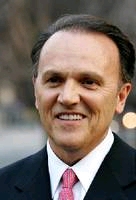There’s an old saying in the legal profession. “When the facts are on your side, pound the facts. When the law is on your side, pound the law. And when neither is on your side, pound the table.”
As crass as that sounds, there is a large element of truth — and that is the consistent triumph of emotional massages over rational ones. It’s also why one good story can squash a statistical proof.
 This came to mind in the last couple of days, as I was thinking about the impact of a very public and high-profile carjacking in downtown Birmingham. Sandra Gregory was kidnapped just outside of her loft apartment, and forced to drive to several ATMs before her rescue Wednesday afternoon.
This came to mind in the last couple of days, as I was thinking about the impact of a very public and high-profile carjacking in downtown Birmingham. Sandra Gregory was kidnapped just outside of her loft apartment, and forced to drive to several ATMs before her rescue Wednesday afternoon.
One element that got attention was the fact that she lived in a newly rejuvenated loft community, one that is actively recruiting professionals to return to urban lifestyles. Her morning commute to the office was generally a two-block walk.
I covered the crime beat in Birmingham for several years, and know first-hand that the crime rate downtown was perhaps the lowest in the entire metro. But all it takes is one high-profile and emotional incident to enflame stereotypes and set back the image and reputation. I didn’t have time to write this yesterday, but I was curious to see who would go back and proactively offer the counter-story — placing this attack in proper context.
This time, it was a cooperative sponsored by downtown businesses that stepped up:
“We have struggled with a perception of downtown safety,” said Teresa Thorne of the City Action Partnership, or CAP security program, a city-operated service that provides escorts and vehicle assistance to residents, workers and visitors downtown. “In the past 10 years, the downtown crime statistics have dropped 59 percent.”
Teresa Thorne is a retired Birmingham Police Captain, who once ran a precinct. Her CAP unit provides escorts and additional presence in the downtown business community. While her job isn’t “PR” per se, it is her job to make people feel more at ease about the safety of that neighborhood.
Other city-promotion agencies like Operation New Birmingham are being proactive in providing the statistical proof of safety. Unfortunately, facts and stats need to be backed up with individual stories, or they will not overpower quotes like this one:
Former downtown resident Edd Dover, who until February lived in the Watts apartment building where Gregory was abducted, said CAP officers help a lot, but problems begin after 5 p.m. and continue overnight, when CAP officers are off duty.
“In that part of downtown, there’s barely any police presence,” said Dover, who said he moved out partly because of vandalism and vagrants in that apartment’s parking lot. “I’m 6 feet 5, but I was always on guard. There were people in the Dumpster when I’d go take my garbage out, and people asking me for money when I’d walk my dog at 5:30 in the morning. Everybody wants this downtown to succeed, but until they clean it up, it won’t work.”
I borrow again from Annette Simmons in The Story Factor:
“People have more facts than they will ever use. They need a new story to give those facts context.”
The book comes with my highest recommendation.
 It’s starting to show up in the coverage of the Ken Lay/Enron prosecution. Apparently,
It’s starting to show up in the coverage of the Ken Lay/Enron prosecution. Apparently,  “This has all the smell of a Richard Scrushy effort,” says Mizzou alum Thomas Battistoni, a New York litigator who until recently sat on an alumni board for the MU College of Arts and Science, overseers of the economics department — and hence the chair. Scrushy, the former head of HealthSouth Corp., poured over $700,000 into Birmingham, Ala., churches and ministries during his felony trial in 2004, a coincidence noted with more than a little skepticism by his prosecutors. (Scrushy was acquitted). Battistoni raises similar questions about Lay’s attempt to divert the money to charities in the fall before his trial started, but he doesn’t believe the money is “tainted” since it was donated before the shenanigans at Enron began.
“This has all the smell of a Richard Scrushy effort,” says Mizzou alum Thomas Battistoni, a New York litigator who until recently sat on an alumni board for the MU College of Arts and Science, overseers of the economics department — and hence the chair. Scrushy, the former head of HealthSouth Corp., poured over $700,000 into Birmingham, Ala., churches and ministries during his felony trial in 2004, a coincidence noted with more than a little skepticism by his prosecutors. (Scrushy was acquitted). Battistoni raises similar questions about Lay’s attempt to divert the money to charities in the fall before his trial started, but he doesn’t believe the money is “tainted” since it was donated before the shenanigans at Enron began.
 I hope I did enough explaining to get them interested, and not so much to scare them out of it. These PR folks are scattered across most of the Western U.S., minus California and Hawaii — and a great deal of land to cover. Any tech tool to push critical information out more quickly can make a big difference.
I hope I did enough explaining to get them interested, and not so much to scare them out of it. These PR folks are scattered across most of the Western U.S., minus California and Hawaii — and a great deal of land to cover. Any tech tool to push critical information out more quickly can make a big difference.


 CEO Jay Grinney toldd analysts yesterday that a new name might be in HealthSouth’s future, to separate it from its past.
CEO Jay Grinney toldd analysts yesterday that a new name might be in HealthSouth’s future, to separate it from its past.


 A few days ago, billboards started popping up around Birmingham, stirring support to shut down figure skating. The billboards linked to a
A few days ago, billboards started popping up around Birmingham, stirring support to shut down figure skating. The billboards linked to a 
 “The Birmingham Steeldogs are in no way opposed to figure skating,” Myers said. “In fact, I have really enjoyed watching the ‘Skating With Celebrities’ television program that airs before ‘24′ on Fox 6.”
“The Birmingham Steeldogs are in no way opposed to figure skating,” Myers said. “In fact, I have really enjoyed watching the ‘Skating With Celebrities’ television program that airs before ‘24′ on Fox 6.” “In response to the two students having been charged with arson of nine Alabama community churches, Birmingham-Southern College has suspended each student from the college and immediately banned them from campus awaiting further action by the authorities. The students, faculty and staff of our college are at once shocked and outraged, and we share the sorrow of our neighbors whose churches represent the heart and soul of their communities.
“In response to the two students having been charged with arson of nine Alabama community churches, Birmingham-Southern College has suspended each student from the college and immediately banned them from campus awaiting further action by the authorities. The students, faculty and staff of our college are at once shocked and outraged, and we share the sorrow of our neighbors whose churches represent the heart and soul of their communities. “The college cooperated in every regard to the investigation by the Federal Bureau of Investigation, the Bureau of Alcohol, Tobacco, and Firearms, and the state Fire Marshall’s Office, and we will continue to do so as needed.â€
“The college cooperated in every regard to the investigation by the Federal Bureau of Investigation, the Bureau of Alcohol, Tobacco, and Firearms, and the state Fire Marshall’s Office, and we will continue to do so as needed.â€





































